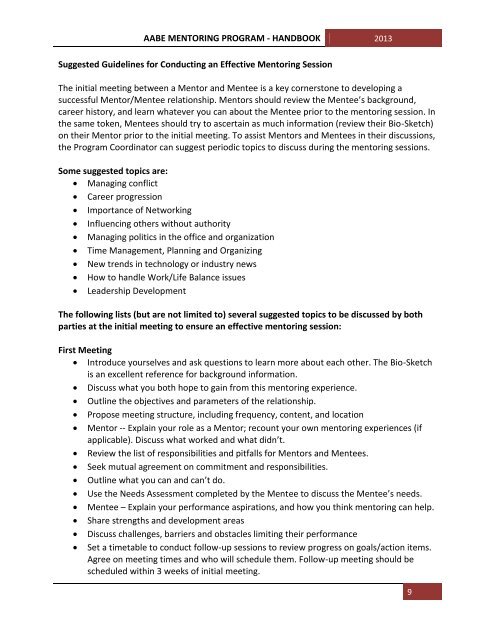2013 Mentoring Handbook
AABE Mentoring Program - Handbook
AABE Mentoring Program - Handbook
- No tags were found...
Create successful ePaper yourself
Turn your PDF publications into a flip-book with our unique Google optimized e-Paper software.
AABE MENTORING PROGRAM - HANDBOOK <strong>2013</strong><br />
Suggested Guidelines for Conducting an Effective <strong>Mentoring</strong> Session<br />
The initial meeting between a Mentor and Mentee is a key cornerstone to developing a<br />
successful Mentor/Mentee relationship. Mentors should review the Mentee’s background,<br />
career history, and learn whatever you can about the Mentee prior to the mentoring session. In<br />
the same token, Mentees should try to ascertain as much information (review their Bio-Sketch)<br />
on their Mentor prior to the initial meeting. To assist Mentors and Mentees in their discussions,<br />
the Program Coordinator can suggest periodic topics to discuss during the mentoring sessions.<br />
Some suggested topics are:<br />
Managing conflict<br />
Career progression<br />
Importance of Networking<br />
Influencing others without authority<br />
Managing politics in the office and organization<br />
Time Management, Planning and Organizing<br />
New trends in technology or industry news<br />
How to handle Work/Life Balance issues<br />
Leadership Development<br />
The following lists (but are not limited to) several suggested topics to be discussed by both<br />
parties at the initial meeting to ensure an effective mentoring session:<br />
First Meeting<br />
Introduce yourselves and ask questions to learn more about each other. The Bio-Sketch<br />
is an excellent reference for background information.<br />
Discuss what you both hope to gain from this mentoring experience.<br />
Outline the objectives and parameters of the relationship.<br />
Propose meeting structure, including frequency, content, and location<br />
Mentor -- Explain your role as a Mentor; recount your own mentoring experiences (if<br />
applicable). Discuss what worked and what didn’t.<br />
Review the list of responsibilities and pitfalls for Mentors and Mentees.<br />
Seek mutual agreement on commitment and responsibilities.<br />
Outline what you can and can’t do.<br />
Use the Needs Assessment completed by the Mentee to discuss the Mentee’s needs.<br />
Mentee – Explain your performance aspirations, and how you think mentoring can help.<br />
Share strengths and development areas<br />
Discuss challenges, barriers and obstacles limiting their performance<br />
Set a timetable to conduct follow-up sessions to review progress on goals/action items.<br />
Agree on meeting times and who will schedule them. Follow-up meeting should be<br />
scheduled within 3 weeks of initial meeting.<br />
9


